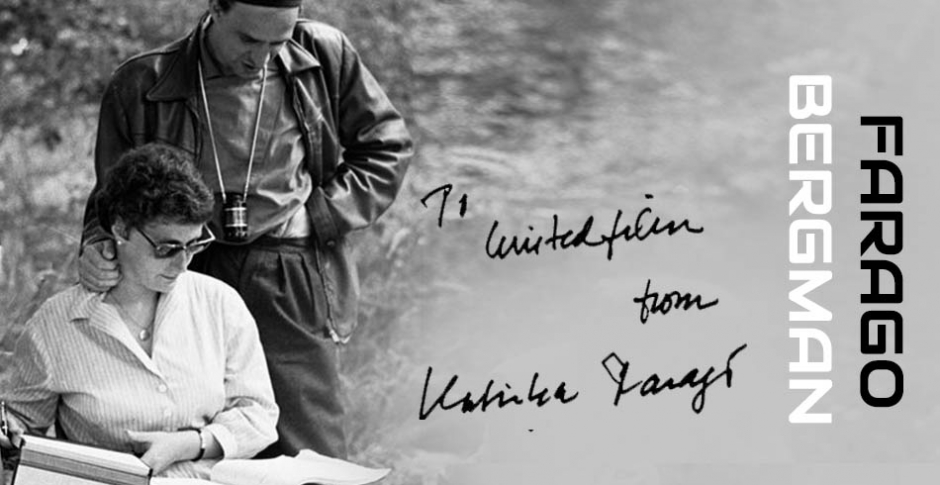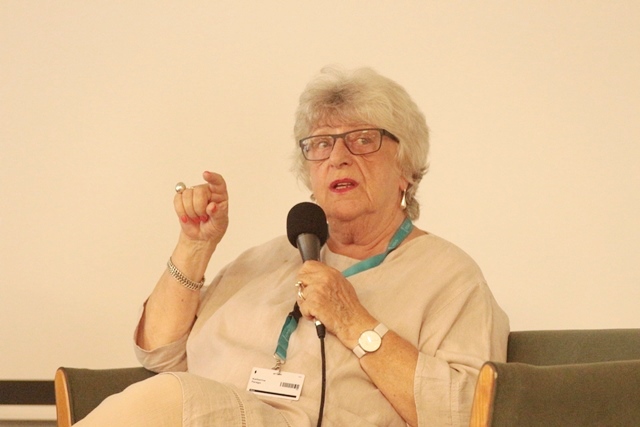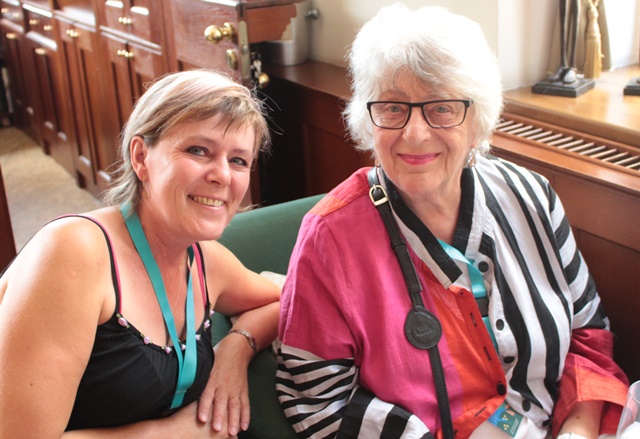Katinka Farago-Bergman knew his job and nobody could beat him
Written by Eva Csölleová, Vítek FormánekKatinka Farago (1936) was the guest of Letní filmová škola 2018. She worked with Ingmar Bergman as his script girl and production manager for three decades so one can´t get much closer to great director than talking to her. She drew a great picture of her collaboration with the master.
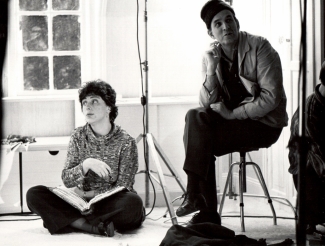 Being a Jew you probably had to escape from Hungary to Sweden, haven´t you? Was it still is peaceful manner or it was a close shave?
Being a Jew you probably had to escape from Hungary to Sweden, haven´t you? Was it still is peaceful manner or it was a close shave?
My father wrote an article against Horty in big newspapers where he was in charge and he was sent to jail for that. He was charged with life sentence but they couldn´t prove anything since he didn t sign it. So he was freed, came out of prison, mum was waiting for him and they went to Vienna, it was in 1935.So my parents lived in Vienna until Anschluss in 1938 and next day they left to Sweden.
Was it your father, who wrote for Swedish film, who introduced you to world of film?
Yes, I was 13 when he started to take me to the sets. It was in summer when they didn´t have enough people so they even called such small kids. Also due to light they filmed mostly in summer, but I never wanted to be an actress. Father died in 1957 but he was instrumental in me focusing on film.
It is said you were employed as a script girl by Ingmar Bergman at he age of 17 since no one wanted to do it. Why, did he have such a bad reputation or it was boring, low paid job with no prospect?
He had bad reputation for his temper. Studio told me I will have to go and work for Ingmar at the age of 17.I asked “Why me?” So I came to him and was staring at him, he was staring at me and after while he said” It will be good” and I stayed with him for 30 years so it wasn´t that bad. I was told by studio later on that Ingmar liked me since I didn´t talk too much. First year was very hard but it improved as the time went. He never apologized in front of the crew. He was very temperament and when he was angry at actors he shouted at ME later on. I was crying very often.
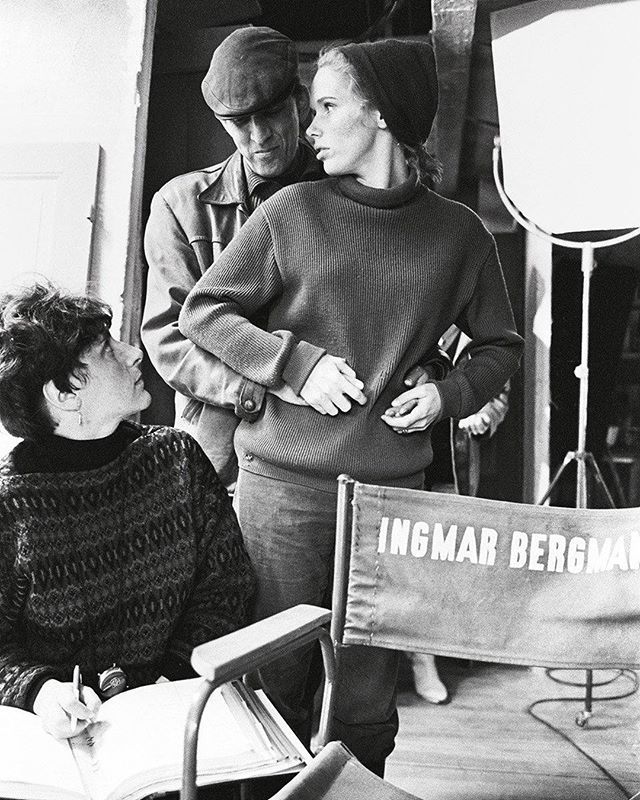 Why didn´t you leave him then when he behaved like that to you?
Why didn´t you leave him then when he behaved like that to you?
At that time, we talk about mid 50´s, we had great respect for people like teacher or priest so it never crossed my mind to leave him. When the film was made and I watched it I liked it and I thought it was worthy all those shed tears.
What was working relationship between you and Ingmar-master and apprentice, father and daughter or teacher and the pupil?
I would think that the last one. Since the studio sent me to him, he never thought about my qualification. He thought “if she was sent to me, she must know something”. When the shooting day was over, he said in front of whole crew
” Let´s look at the mistakes Katinka made”. I was shocked and started to cry and he told me”I will teach you the craft”. He never discussed the art, it was only his thing.
Did you have to learn hard way when you can ask him a question, when to avoid him or he let you do your job and expected 100% from you and the rest was his problem?
You couldn´t work that way.When you are on set you can´t wait for the right moment you have to solve the problem now, so I actually learned as I walked.
Did Ingmar take opinions of his crew and did he ask them what they think and maybe even changed his view or he was stubborn?
No, script was holy thing. You could not change anything while filming because it would be very confusing. He didn´t do that and good director doesn´t do it cos he believes in what he is doing. When actors had a script from him, they knew what he wanted, they didn´t have to improvise anything. When he made a film Seventh Seal, he only had 35 days to shoot it. Every evening he did his homework for next day, he didn´t change a thing at the script. Film was a big success and since that time he could shoot whatever he wanted.
Could you take us through one filming day with Ingmar?
If you are a script girl you have to be there in time, it´s very important and whole of my life I did just that. So I came to set at 8. a.m and we started at studio at 8.30.Ingmar came and talked with the actors and the crew about what we will do that day. Then he took actors by the hand and walked them through the scenes. He was very touchy person he had to have that feeling of human person understanding him. Then he told how he wants to have camera set-up and there was a pause for the actors and some crew. Ingmar was telling stories, which was a good fun, he liked to create good atmosphere on the set. We had pop music in the studio all the time, it was a novelty but it was a method how to help relax people. And then he said” That´s it”. When the camera started filming, there had to be silence, but before that it was loud atmosphere on the set, nobody believes that….. but it´s truth.
From production point of view it was great. We very seldom made the overtime since we planned everything. Sometimes he told me” How can you do such dumb thing, I can´t do that” to which I replied” But you don´t t have that actor at the very day”. Sometimes he came to his office at 4.45 p.m.” We didn´t do the full programme”. So I started to think what shall I do now?” but hew came to my office and said” Don´t worry I will fix it tomorrow morning.. He came home, did his homework and next morning it was fixed since he found the solution. He was the most organized man I have ever met.
 You worked for him for 30 years on 19 films and probably are the longest serving crew member. Did the chemistry worked between you so you became his right hand and a person whom he talked to about everything, money, family thing etc?
You worked for him for 30 years on 19 films and probably are the longest serving crew member. Did the chemistry worked between you so you became his right hand and a person whom he talked to about everything, money, family thing etc?
I was employed as very young girl as you know and one day I came crying to the studio because I had some unhappy spell and he came to me and said” Never come with your private life to the studio”. So I didn´t do it again and he never did it either.
Was it difficult task to be his production manager? Did he take into account commercial potential or always went for his artistic explanation and you had to tell him” Hey, no one will come and watch this”?
No, I would never dream about that. We went through this at the beginning of planning so when we started shooting it was already laid out. Once during Autumn Sonata I found out Bergman was very ill, so he had to finish the film very quickly. It was only him and I knowing this, we didn´t tell the crew, why we were changing everything since we have never done that before. So they were wondering what was going on, it was big thing for them.
Him being accused of not paying the tax, was it truth or media bubble and accusation?
It was not true. He was freed afterwards but they insulted him badly, he became very ill because of that and moved out of Sweden to Germany. I don´t think they apologized to him when he returned.
What made him such a great filmmaker in your view-way he filmed and told the story, topic of his films or mixture of good screenplay, music, camera, directing and actors?
He knew his job. He knew it technically and nobody could beat him. He was fantastic with actors, they trusted him. He received what they gave and they felt totally secured which is very very important for an actor. There are not many directors who understand this. He also respected people around him very much. He worked with actors in theater in Malmö during winter and during summer they made a film together, so they knew each other well and her had great respect for Bibi Anderson or Max von Sydow.
Ingmar kept the same crew for each film which I think is very wise since he knew them well and knew what he can expect from them. He knew he can´t make a movie just by himself.
Also when he was on the island he always watched any kind of movies and he also learned from them. Sometimes he admired something in them and wondered how it was made. He didn´t think he was a film God or the biggest director ever. In last years I was sitting with him in the morning in dark dressing room, holding his hands. He was so anguished before he went to the set and at 8.30 I told him” Ingmar, put your slippers on, you have to go to the studio” And he went and made his great films. We did this every morning even in his prime time and in last year more often than ever. So he never thought he is the greatest, He always tried to do his best but of course sometimes he came back in the evening and wasn´t very happy with what he made.
When we were shooting film, every Thursday at 7.p.m.we had what he called
“Film evening”. He showed two short films and two feature films of his choice. So we saw the Japanese films or Tarkovski before they were showed in Sweden. We also saw Swedish silent films, they were fantastic, because Sweden was very big in silent movies era. The whole crew with actors sat there and watched the movies and then we talked about them. That was my film school.
How long did it take him to write a script and did he have special place, where to write it?
He usually wrote it at home and the time of writing varied on the topic. He discussed it only with production and once it was finished, it never changed it. I was working with 60 directors so I can compare what they wrote and I must admit I never read a crap script from Bergman. When we filmed a movie called Emigrants, there were only 16 of us going to shoot it in America. Today it would be at least over 60, so you see how neatly planned it was.
Did he watch dailies and what was his attitude to music, how important that was for him?
He watched dailies once a week and rarely did the re- takes. I watched them every day. Music was very important for him, he was great expert of music and had big collection of records.
Woody Allen claims Ingmar was his inspiration and he is his big fan. Did they ever met?
We were once in New Year watching dubbing his film in studio and he got bored so he took me to 3rd avenue and we went to cinema. We watched Woody Allen´s film Interiors which he claimed to be inspired by Bergman. After that he visited Allen´s production room and thanked him for great film. They agreed on dinner in Ingmar´s hotel, so Woody came via kitchen not to be seen. I was told it was very quiet dinner since both were so shy to talk that none of them said anything.
Woody Allen sells his films without showing any script to distributor and actors are happy to play for him for ordinary salary. Did something like that happen in Ingmar´s case, too?
During shooting Scenes From Marriage I believe he didn´t have much money so all actors chipped in and they played for third of the salary of half of the salary and they got quite a lot afterwards since film was a success all around the world. It was also big privilege for actors to play in his films, I bet you. But unlike Woody Allen, Ingmar watched his films once he completed them.
When he died, was it a big thing is Sweden?
Yes, it was a big thing but funeral, was held on the island so only family and local people came there including about 5 actors.
How do you view Swedish cinematography now?
I don´t like what is happening in Sweden now. In 50´s and 60´s directors could experiment more. We had three big film studios and they allowed directors to try various things-they were REAL film studios. It was before TV came into force and people used to go to movies a lot. It was much different.


